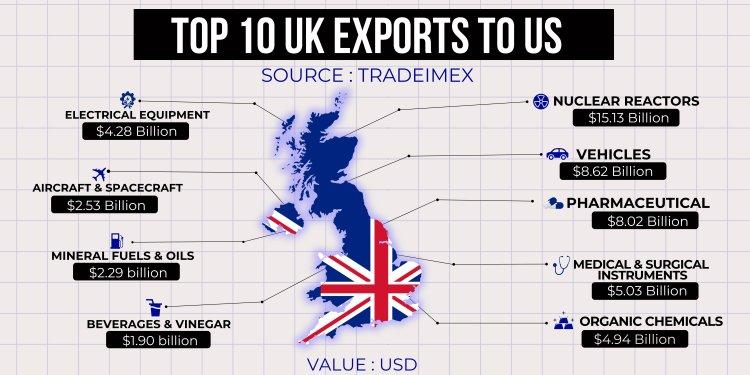The economic partnership between the United States and the United Kingdom stands as one of the most significant bilateral trade relationships globally. As both nations navigate a rapidly evolving landscape marked by post-Brexit adjustments, shifting trade policies, and emerging market challenges, congressional attention on U.S.-UK trade relations has intensified. This article delves into the background of the transatlantic trade ties and highlights key issues currently shaping the dialogue on Capitol Hill, shedding light on the legislative considerations and strategic priorities outlined on Congress.gov.
U.S.-UK Trade Relations Historical Overview and Economic Impact
The trade relationship between the United States and the United Kingdom has long been a cornerstone of global economic cooperation, characterized by a shared language, legal systems, and deep historical ties. Over the decades, bilateral trade has evolved through multiple phases-ranging from post-World War II recovery efforts to the modern push toward digital and services-based exchange. Key sectors driving this partnership include finance, aerospace, pharmaceuticals, and technology, which together account for a substantial portion of cross-border investment and commerce. The dynamic has often been shaped by changing political landscapes, regulatory reforms, and emerging global challenges, yet the foundation remains resilient.
Economic impacts of the U.S.-UK trade relationship include:
- Job creation: Millions of jobs on both sides depend on the free flow of goods and services between the two nations.
- Innovation collaboration: Joint ventures and research initiatives frequently support advances in cutting-edge industries.
- Investment flows: Consistent mutual direct investment has bolstered growth and infrastructure development.
| Trade Metric | 2010 | 2023 | % Change |
|---|---|---|---|
| U.S. Exports to UK (Billion $) | 50 | 85 | +70% |
| UK Exports to U.S. (Billion $) | 55 | 90 | +64% |
| Bilateral Investment (Billion $) | 300 | 510 | +70% |
Navigating Key Challenges in Bilateral Trade Agreements
Negotiating bilateral trade agreements between the U.S. and the UK involves addressing an array of complex challenges that span economic, regulatory, and political domains. One of the most pressing issues is ensuring regulatory alignment while respecting each country’s sovereignty. Divergences in standards related to food safety, environmental protections, and data privacy require meticulous negotiations to create frameworks that facilitate trade without compromising national interests. Additionally, balancing sectors such as agriculture and financial services proves difficult, as each side seeks favorable terms that support domestic industries while promoting market access abroad.
Another critical challenge lies in managing public perception and political will. Trade agreements often face scrutiny over potential impacts on labor markets and consumer protections. Lawmakers must weigh concerns about job displacement against potential gains from increased cross-border investment and innovation. Key considerations during negotiation include:
- Safeguarding intellectual property rights while promoting technology transfer
- Addressing trade remedies and dispute resolution mechanisms
- Ensuring transparency and stakeholder engagement throughout the process
- Mitigating risks associated with supply chain disruptions
| Challenge | U.S. Priority | UK Priority |
|---|---|---|
| Agricultural Standards | Food Safety & Hormone Use | Market Access & Quality Control |
| Financial Services | Regulatory Equivalence | Market Liberalization |
| Data Privacy | Cross-Border Data Flow | Alignment with GDPR |
Policy Recommendations for Strengthening Transatlantic Commerce
To enhance the robustness of U.S.-UK trade relations, policymakers should prioritize regulatory harmonization that eases cross-border commerce while maintaining high standards for consumer safety and environmental protection. Streamlining customs procedures by adopting mutual recognition agreements can significantly reduce costs and delays for exporters and importers on both sides of the Atlantic. Additionally, fostering digital trade frameworks will be essential in addressing emerging challenges related to data privacy, cybersecurity, and e-commerce, ensuring that businesses remain competitive in an increasingly digital global market.
Strengthening collaboration on investment protections and dispute resolution is another critical area. Establishing clearer mechanisms for arbitration can build investor confidence and mitigate uncertainties stemming from political or economic shifts. Moreover, targeted support for small and medium-sized enterprises (SMEs) through improved access to financing and export resources can diversify trade benefits and stimulate innovation. The table below highlights key focus areas and potential actions to amplify the efficacy of transatlantic commerce policies:
| Focus Area | Recommended Actions | Expected Impact |
|---|---|---|
| Customs & Border Efficiency | Implement joint customs clearance protocols | Faster shipments, reduced costs |
| Digital Trade | Standardize data privacy standards | Improved trust, expanded e-commerce |
| Investment Protection | Enhance arbitration frameworks | Greater investor security |
| SME Support | Launch bilateral export assistance programs | Widened market access |
Final Thoughts
As U.S.-UK trade relations continue to evolve against a backdrop of political shifts and global economic challenges, understanding the historical context and key issues remains essential for policymakers and stakeholders alike. Congress.gov provides a valuable resource in tracking legislative developments that shape this bilateral partnership. Moving forward, close monitoring of trade negotiations, regulatory alignment, and sector-specific concerns will be critical in determining the trajectory of economic ties between the two nations.




